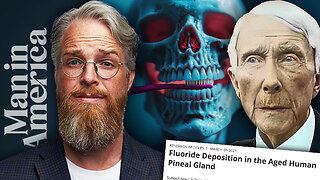Premium Only Content

How it Works - Chapter 5 - Big Book - Alcoholics Anonymous - Read Along
How it Works - Chapter 5 - Big Book - Alcoholics Anonymous
Steps 3 & 4 Made a decision to turn our will and our lives over to the care of God, as we understood him. Made a searching and fearless moral inventory of ourselves.
Half measures availed us nothing. We stood at the turning point. We asked His protection and care with complete abandon.
Here are the steps we took, which are suggested as a program of recovery:
1. We admitted we were powerless over alcohol— that our lives had become unmanageable.
2. Came to believe that a Power greater than our- selves could restore us to sanity.
3. Made a decision to turn our will and our lives over to the care of God as we understood Him.
4. Made a searching and fearless moral inventory
of ourselves.
5. Admitted to God, to ourselves, and to another
human being the exact nature of our wrongs.
6. Were entirely ready to have God remove all
these defects of character.
7. Humbly asked Him to remove our shortcomings.
8. Made a list of all persons we had harmed, and
became willing to make amends to them all.
9. Made direct amends to such people wherever possible, except when to do so would injure
them or others.
10. Continued to take personal inventory and when
we were wrong promptly admitted it.
11. Sought through prayer and meditation to improve our conscious contact with God as we understood Him, praying only for knowledge of His will for us and the power to carry that out.
12. Having had a spiritual awakening as the result of these steps, we tried to carry this message to alcoholics, and to practice these principles in all our affairs.
Many of us exclaimed, “What an order! I can’t go through with it.’’ Do not be discouraged. No one among us has been able to maintain anything like per- fect adherence to these principles. We are not saints. The point is, that we are willing to grow along spiritual lines. The principles we have set down are guides to progress. We claim spiritual progress rather than spiritual perfection.
Our description of the alcoholic, the chapter to the agnostic, and our personal adventures before and after make clear three pertinent ideas:
(a) That we were alcoholic and could not manage our own lives.
(b) That probably no human power could have re- lieved our alcoholism.
(c) That God could and would if He were sought.
Being convinced, we were at Step Three, which is that we decided to turn our will and our life over to God as we understood Him. Just what do we mean by that, and just what do we do?
The first requirement is that we be convinced that any life run on self-will can hardly be a success. On that basis we are almost always in collision with some- thing or somebody, even though our motives are good. Most people try to live by self-propulsion. Each per- son is like an actor who wants to run the whole show; is forever trying to arrange the lights, the ballet, the scenery and the rest of the players in his own way. If his arrangements would only stay put, if only people would do as he wished, the show would be great. Everybody, including himself, would be pleased. Life would be wonderful. In trying to make these arrange- ments our actor may sometimes be quite virtuous. He may be kind, considerate, patient, generous; even modest and self-sacrificing. On the other hand, he may be mean, egotistical, selfish and dishonest. But, as with most humans, he is more likely to have varied traits.
Therefore, we started upon a personal inventory. This was Step Four. A business which takes no regular inventory usually goes broke. Taking a commercial inventory is a fact-finding and a fact-facing process. It is an effort to discover the truth about the stock-in- trade. One object is to disclose damaged or unsalable goods, to get rid of them promptly and without regret. If the owner of the business is to be successful, he can- not fool himself about values.
We did exactly the same thing with our lives. We took stock honestly. First, we searched out the flaws in our make-up which caused our failure. Being con- vinced that self, manifested in various ways, was what had defeated us, we considered its common manifes- tations.
Resentment is the “number one’’ offender. It destroys more alcoholics than anything else. From it stem all forms of spiritual disease, for we have been not only mentally and physically ill, we have been spiritually sick. When the spiritual malady is overcome, we straighten out mentally and physically. In dealing with resentments, we set them on paper. We listed people, institutions or principles with whom we were angry. We asked ourselves why we were angry. In most cases it was found that our self-esteem, our pocketbooks, our ambitions, our personal relationships (including sex) were hurt or threatened. So we were sore. We were “burned up.’’
Spiritual principles helping to live your best life without alcohol and drugs.
Recovery from unhealthy habits and creating solutions for a long happy and useful life.
-
 1:12:23
1:12:23
The Bold Lib
16 hours agoSay Something Beyond W/MikeMac: JOKER - Ep.12
50 -
 LIVE
LIVE
LFA TV
16 hours agoLIVE & BREAKING NEWS! | MONDAY 11/3/25
3,279 watching -
 1:30:13
1:30:13
Game On!
13 hours ago $6.64 earnedChiefs Dynasty OVER, New Longest FG RECORD, and Patriots Are Winning The Super Bowl!
18.1K2 -
 LIVE
LIVE
The Bubba Army
3 days agoIS AMERICA OVER TRUMP? - Bubba the Love Sponge® Show | 11/03/25
1,444 watching -
 48:57
48:57
Man in America
18 hours agoThe Sinister Reason They Put Fluoride in Everything w/ Larry Oberheu
362K100 -
 1:06:56
1:06:56
Sarah Westall
15 hours agoAstrological Predictions, Epstein & Charlie Kirk w/ Kim Iversen
99.8K71 -
 2:06:49
2:06:49
vivafrei
1 day agoEp. 289: Arctic Frost, Boasberg Impeachment, SNAP Funding, Trump - China, Tylenol Sued & MORE!
287K215 -
 2:56:28
2:56:28
IsaiahLCarter
19 hours ago $14.64 earnedThe Tri-State Commission, Election Weekend Edition || APOSTATE RADIO 033 (Guest: Adam B. Coleman)
62.7K8 -
 15:03
15:03
Demons Row
15 hours ago $16.29 earnedThings Real 1%ers Never Do! 💀🏍️
77.5K25 -
 35:27
35:27
megimu32
18 hours agoMEGI + PEPPY LIVE FROM DREAMHACK!
196K15